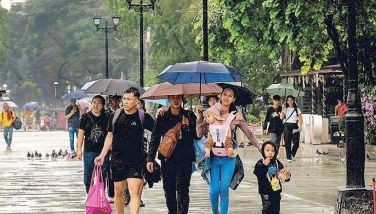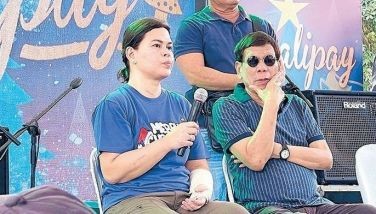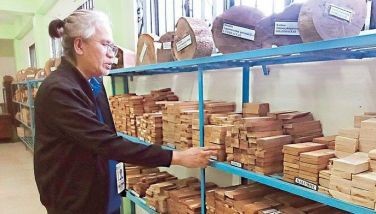1,173 undocumented Filipinos detained in Sabah — DFA
April 11, 2006 | 12:00am
A total of 1,173 undocumented Filipinos, 241 of them children, are being held at a detention center in Sabah, Malaysia the Department of Foreign Affairs (DFA) reported yesterday.
The DFA provided the data based on the report of Simit Kiah, the assistant head of the Menggatal Temporary Detention Center for illegal aliens in Kota Kinabalu, Sabah where the Filipinos are being held.
Ambassador to Malaysia Victoriano Lecaros said that the Philippine Embassy in Kuala Lumpur is facilitating the issuance of repatriation and travel documents to the affected Filipinos so they may return to the Philippines at the soonest possible time.
Of the total number of 1,173 undocumented Filipinos at the Menggatal detention center, 625 are adult males, 307 are women, 151 are boys and 90 are girls.
DFA spokesman Gilberto Asuque said the detention facility is merely a holding area for foreign nationals arrested for not having the proper visas or working papers in Sabah.
It was unclear how long the Filipinos have been detained in the facility, but Asuque said there is a process being followed based on Malaysian laws.
He said the apprehended undocumented Filipinos must serve out their "sentences" at the facility before they are be allowed to return home.
Once the repatriation process begins, the Philippine embassy in Kuala Lumpur will coordinate with a shipping company for their trip back to the Philippines.
"As soon as the internal court processes are completed, then the embassy is ready to assist them by providing the necessary documents for the Filipinos to return to the Philippines," Asuque said.
In most cases, Filipinos from Sabah are shipped to Zamboanga, being the port closest to the Malaysian state, he said.
"This is a recurring concern that the embassy is always facing because of the closeness of the southern islands of the Philippines with Sabah and you have a number of our nationals going to that country without the necessary papers," Asuque added.
The report from the detention center came just a few days after a mass escape involving 64 undocumented individuals occurred.
Malaysian authorities have launched a massive manhunt for the escaped detainees, two of whom surrendered shortly after the incident Saturday.
Asuque said it was still unclear how many of the escapees were Filipino, as the facility also housed undocumented Indonesians.
Based on published reports, the incident started with an argument over a sick child that escalated into a riot and a mass breakout.
The parents of the child reportedly demanded medical attention for their child and instead got into a heated argument with the guards.
In a show of support for the concerned family, the other detainees banged on the prison walls, stomped on the plank floors and shouted at the guards.
While the authorities were trying to control the situation, 64 detainees managed to scale the center’s fence and escape.
Lecaros assured the DFA that the Philippine embassy in Kuala Lumpur will work to ensure that the rights of the affected Filipinos are protected.
Philippine officials are cooperating with the Malaysian authorities in looking into the conditions of the Menggatal detention center, Lecaros said. The detention center was meant to temporarily house illegal immigrants pending deportation, but authorities in the illegal immigrants home countries often refuse to take them back, demanding greater proof of citizenship.
Several human rights organizations are also closely monitoring the conditions of the detained foreigners in Malaysia because of various abuses committed in the past.
In Zamboanga City, social welfare officials said the mass deportation of illegal Filipino migrants from Sabah continues, as 426 deportees arrived Saturday in this southern port city from the Malaysian island.
About 3,000 Filipino deportees have been deported over a three-month period this year as Malaysian authorities continued their crackdown on illegal aliens, the regional office of the Department of Social Welfare and Development (DSWD) said.
The fresh batch of deportees arrived aboard a commercial ferry from the Sabah port of Sandakan. Most of them were children and women rounded up and detained for weeks by the Malaysian police.
Except for three children who were seriously ill, all the deportees were in good condition, according to the crisis intervention unit (CIU), a team of DSWD which is looking after the welfare of the deportees.
The sick children were immediately hospitalized at the City Medical Center.
The deportees said they were not maltreated during their detention at the confinement center in Sabah while awaiting deportation.
One male deportee, however, said, "life was very difficult inside the confinement centers where we have to cramp with our fellow deportees and be contented with what was offered to us."
The deportee, who asked not to be named, said that he still plans to return to Sabah and work there after securing the proper documents.
The CIU disclosed most of those deported Saturday were natives of the provinces of Tawi-Tawi, Sulu, Basilan and Palawan.
Some of the female deportees said they stayed as "illegal residents" in Sabah for years and only surrendered to Malaysian authorities so they could return to the Philippines because their husbands were deported.
The DSWD regional office reported that, since March it has recorded some 2,000 Filipino deportees and are expecting thousands more because the Malaysian authorities are deporting illegal aliens every week by the hundreds. — Marvin Sy, Roel Pareño, AP
The DFA provided the data based on the report of Simit Kiah, the assistant head of the Menggatal Temporary Detention Center for illegal aliens in Kota Kinabalu, Sabah where the Filipinos are being held.
Ambassador to Malaysia Victoriano Lecaros said that the Philippine Embassy in Kuala Lumpur is facilitating the issuance of repatriation and travel documents to the affected Filipinos so they may return to the Philippines at the soonest possible time.
Of the total number of 1,173 undocumented Filipinos at the Menggatal detention center, 625 are adult males, 307 are women, 151 are boys and 90 are girls.
DFA spokesman Gilberto Asuque said the detention facility is merely a holding area for foreign nationals arrested for not having the proper visas or working papers in Sabah.
It was unclear how long the Filipinos have been detained in the facility, but Asuque said there is a process being followed based on Malaysian laws.
He said the apprehended undocumented Filipinos must serve out their "sentences" at the facility before they are be allowed to return home.
Once the repatriation process begins, the Philippine embassy in Kuala Lumpur will coordinate with a shipping company for their trip back to the Philippines.
"As soon as the internal court processes are completed, then the embassy is ready to assist them by providing the necessary documents for the Filipinos to return to the Philippines," Asuque said.
In most cases, Filipinos from Sabah are shipped to Zamboanga, being the port closest to the Malaysian state, he said.
"This is a recurring concern that the embassy is always facing because of the closeness of the southern islands of the Philippines with Sabah and you have a number of our nationals going to that country without the necessary papers," Asuque added.
The report from the detention center came just a few days after a mass escape involving 64 undocumented individuals occurred.
Malaysian authorities have launched a massive manhunt for the escaped detainees, two of whom surrendered shortly after the incident Saturday.
Asuque said it was still unclear how many of the escapees were Filipino, as the facility also housed undocumented Indonesians.
Based on published reports, the incident started with an argument over a sick child that escalated into a riot and a mass breakout.
The parents of the child reportedly demanded medical attention for their child and instead got into a heated argument with the guards.
In a show of support for the concerned family, the other detainees banged on the prison walls, stomped on the plank floors and shouted at the guards.
While the authorities were trying to control the situation, 64 detainees managed to scale the center’s fence and escape.
Lecaros assured the DFA that the Philippine embassy in Kuala Lumpur will work to ensure that the rights of the affected Filipinos are protected.
Philippine officials are cooperating with the Malaysian authorities in looking into the conditions of the Menggatal detention center, Lecaros said. The detention center was meant to temporarily house illegal immigrants pending deportation, but authorities in the illegal immigrants home countries often refuse to take them back, demanding greater proof of citizenship.
Several human rights organizations are also closely monitoring the conditions of the detained foreigners in Malaysia because of various abuses committed in the past.
In Zamboanga City, social welfare officials said the mass deportation of illegal Filipino migrants from Sabah continues, as 426 deportees arrived Saturday in this southern port city from the Malaysian island.
About 3,000 Filipino deportees have been deported over a three-month period this year as Malaysian authorities continued their crackdown on illegal aliens, the regional office of the Department of Social Welfare and Development (DSWD) said.
The fresh batch of deportees arrived aboard a commercial ferry from the Sabah port of Sandakan. Most of them were children and women rounded up and detained for weeks by the Malaysian police.
Except for three children who were seriously ill, all the deportees were in good condition, according to the crisis intervention unit (CIU), a team of DSWD which is looking after the welfare of the deportees.
The sick children were immediately hospitalized at the City Medical Center.
The deportees said they were not maltreated during their detention at the confinement center in Sabah while awaiting deportation.
One male deportee, however, said, "life was very difficult inside the confinement centers where we have to cramp with our fellow deportees and be contented with what was offered to us."
The deportee, who asked not to be named, said that he still plans to return to Sabah and work there after securing the proper documents.
The CIU disclosed most of those deported Saturday were natives of the provinces of Tawi-Tawi, Sulu, Basilan and Palawan.
Some of the female deportees said they stayed as "illegal residents" in Sabah for years and only surrendered to Malaysian authorities so they could return to the Philippines because their husbands were deported.
The DSWD regional office reported that, since March it has recorded some 2,000 Filipino deportees and are expecting thousands more because the Malaysian authorities are deporting illegal aliens every week by the hundreds. — Marvin Sy, Roel Pareño, AP
BrandSpace Articles
<
>
- Latest
- Trending
Trending
Latest
Trending
Latest
Recommended






























